Champagne Marguet Shaman Extra Brut Grand Cru
ABOUT
ABOUT
If it weren’t for an unfortunately timed decision by Marguet founder, Émile Marguet, in the late 1800’s Champagne Marguet might be more of a house name amongst wine lovers today. The family history in Champagne dates back to the 1850’s and at their peak they owned 90 hectares of vines. In 1883 Émile made the decision to graft all of his vines onto American rootstocks in the face of the impending invasion of phylloxera, he was one of the first to do so. Unfortunately because he was so far ahead of the curve he was widely ridiculed and even condemned by his peers for making this decision to the point that he was eventually forced to pull all the vines back out and replant. The cost of replanting everything twice in such a short time bankrupt the whole operation and Émile sold off his wonderful collection of vineyards to Champagne Henriot shortly after. Phylloxera didn’t reach Champagne til 1890, just a little too late to vindicate Émile’s decisions.
The current iteration of Marguet begins with Benoît’s parents who in the early 70’s created the Marguet-Bonnerave estate and then later his father started a négociant label called, Charles Marguet, which was later renamed Marguet Père et Fils. Benoît began making the wines under both labels in 1999 and by 2005 he took control of the Marguet Père et Fils label entirely. For the first few years all of the fruit was purchased, primarily from premier & grand cru sites that were farmed organically. In 2008 Benoît was finally able to purchase some of the family’s vineyard holdings to be used exclusively for his wines, he was also able to negotiate contracts for fruit from parcels owned by other family members, which he farms himself.
Roughly 15% of Marguet’s production still comes from purchased fruit and since 2011 all of the purchased fruit comes exclusively from vineyards that are certified organic or are in conversion to organics.
All of the vineyards that Benoît farms are done so with biodynamic practices and since 2009 he has been experimenting with plowing by horse. He now owns two horses that are capable of plowing all of the vineyards he owns and farms.
In 2006 he began working with Hervé Jestin, former chef de cave of Duval-Leroy, as a consultant to the estate. Much of Benoît’s winemaking practices have evolved to reflect Hervé’s influence and preference for homeopathic and biodynamics in the cellar. The two have even created a special cuvée together that is a direct representation of Hervé’s philosophies. Half of the production is bottled under Jestin’s label, the rest under the Sapience label from Benoît. The first release was in 2013 from the 2006 vintage.
All fermentations take place in oak barrels with native yeasts, Marguet prefers the added complexity that barrel ferments develop. He also finds that working with wood brings him closer to nature as opposed to steel, which is cold and impersonal in his mind. All wines go through malolactic fermentation and spend extended periods on their lees. Cellar work is done naturally through gravity flow with decisions like racking, digorgement, & bottling being made based on the lunar calendar. Benoît has also been pushing to use less and less SO2 and in 2012 80% of his production was produced sans soufre. Average SO2 is at most 25ppm.
Marguet is currently certified organic by Ecocert and certified biodynamic by Demeter.
Couldn't load pickup availability









